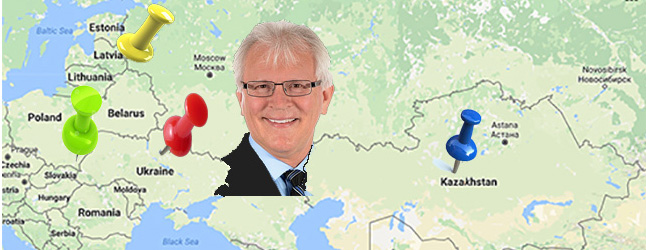
By David F. Rooney
There’s nothing like a trip to four countries that live in fear of theIr neighbour — the Russian bear.
It was Wayne Stetski’s first trip abroad as a Member of Parliament asked to participate in the House of Commons Standing Committee on Foreign Affairs and International Development’s 12-day mission to Ukraine, Latvia and Poland in Eastern Europe, and Kazakhstan in Central Asia. Although Stetski is not a regular member of the all-party committee, he was asked to fill in for the NDP committee member who could not participate. This trip was intended to allow the MPs to understand the Canadian interests that are at stake, the kinds of assistance and engagement that countries in these regions are seeking from Canada, and the optimal approach for Canada’s policies toward them
“It’s a big world out there,” Stetski (NDP — Kootenay-Columbia) said in a telephone interview held Monday, January 30, after he returned to Canada. “We’re so lucky to live here.”
He said all four countries are very aware of Russia’s military campaigns against Chechnya, Dagestan, Georgia, Ossetia, Ukraine and now Syria.
Latvia and Poland have some protection as full members of the North Atlantic Treaty Organization, whose famous article 5 enshrines the principle of collective defence at the very heart of NATO’s founding Washington Treaty. It remains a unique and enduring principle that binds its members together, committing them to protect each other and setting a spirit of solidarity within the Alliance.
That NATO membership is what is prompting Canada to station a battalion of 450 soldiers to Latvia this year. In 2014 six CF-18s were stationed in Romania, also a NATO member. The twin-engine fighters run air patrols in Eastern and Central Europe in response to Russian actions very reminiscent of the clear Soviet provocations involving military jets that challenged Canadian, American and other NATO aircraft and ships on a regular basis.
However, Ukraine and Kazakhstan have no such military shield to protect them from the Russians.
Stetski said the Latvians who were conquered by the Soviet Union in 1921 and then reconquered in 1943-44, are openly asking, “Who’s next?” The Soviets moved a large population of Russians into Latvian territory after the Second World War. That population remained in Latvia (neighbouring Lithuania and Estonia have similarly large Russian minorities) after the fall of the Soviet Union and the Latvians, Lithuanians and Estonians all fear the Russian could use ‘abuse’ of these ethnic Russian populations as a casus belli — a cause for war — as they did when they conducted their little coup d’etat in the Crimean Peninsula and Eastern Ukraine.
Stetski said these countries, to one degree or another, share our democratic values and receive assistance from Canada when it comes down to improving their policing and justice systems. Click here to read about our relationship with Latvia.
Ukraine, in particular has 11,000 new police officers who are being trained by the RCMP. Professional police training, it is hoped, will identify and eliminate corrupt holdover from the old days, he said.
“Ukraine has already fired all of their Supreme Court judges and 2,000 other judges,” Stetski said, adding that these actions have been pushed by mostly young people in government.
Click here to read about our relationship with the Ukraine.
Kazakhstan has good relations with Canada, which is, according to Global Affairs Canada, a strong supporter of the Central Asian country’s 100 Concrete Steps Initiative, Canada regularly shares its models and experience in a variety of sectors, including public sector reform, immigration policy and economic reform. Canada is also committed to supporting the development of Kazakhstan’s vocational and technical education system and Canadian post-secondary institutions have been actively recruiting students there, providing an opportunity to more than 200 Kazakhstani students currently studying in Canada.
While Canada has excellent relations with Poland. Click here to read more about our bilateral relationship with the Poles.
However, as lovely as our relations seem to be we cannot forget that they are different cultures with slightly different takes on democracy and security.
“As you probably remember, I collect different saying from different place,” Stetski said. “There’s one I heard in the Ukraine, which I found pretty interesting: “Vision without resources is hallucination.”
Now that the committee is back in Canada it will hold hearings in Ottawa to learn more about the various issues, the MPs discussed while they were abroad.



